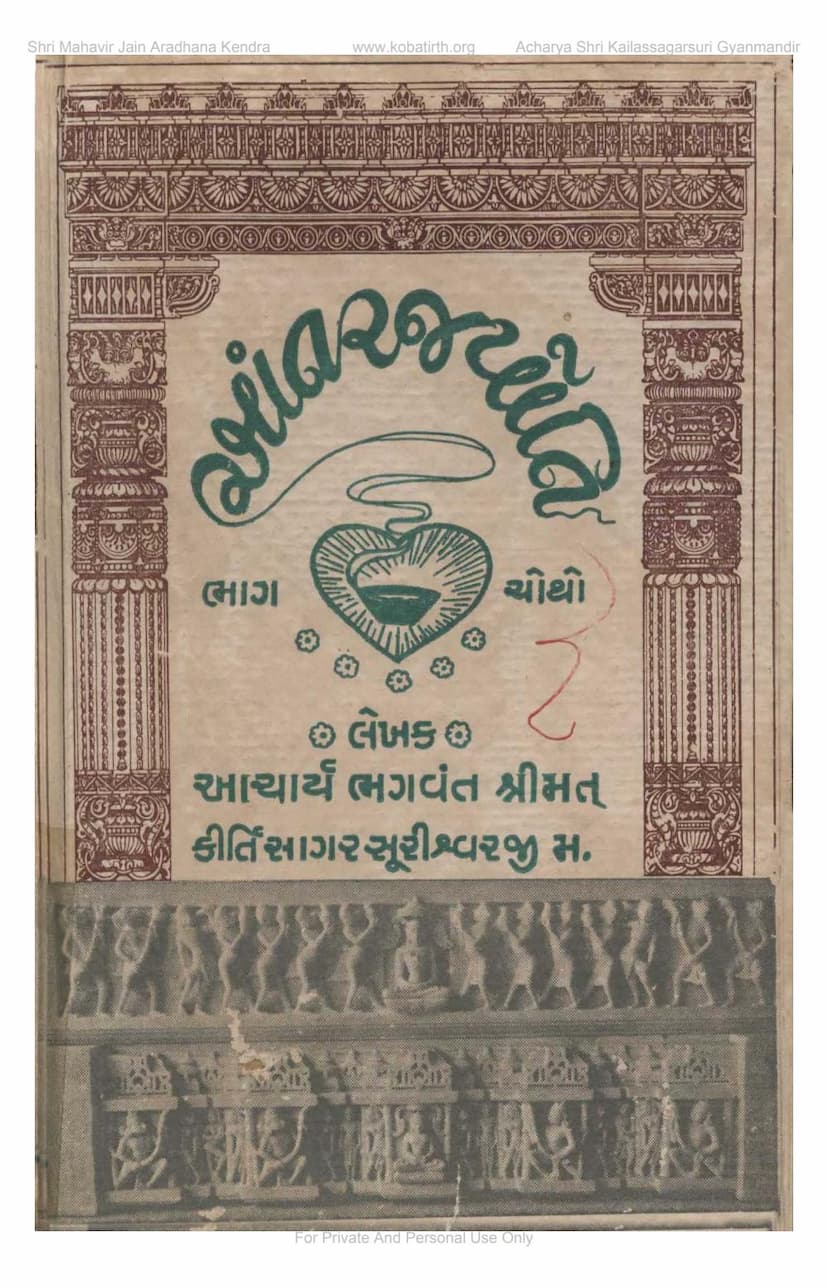Antarjyoti Part 4
Added to library: September 1, 2025

Summary
Here's a comprehensive summary of the Jain text "Antarjyoti Part 4" by Acharya Kirtisagarsuri, based on the provided pages:
Overall Theme:
"Antarjyoti Part 4" (Inner Light, Part 4) is a Jain spiritual text authored by Acharya Kirtisagarsuri. Published by Adhyatma Gyan Prasarak Mandal, the book delves into the core principles of Jainism, focusing on self-improvement, spiritual awakening, and the path to liberation. It emphasizes the importance of inner purification, detachment from worldly desires, and the cultivation of virtues to overcome karmic obstacles and realize the true nature of the soul.
Key Concepts and Content:
The book is structured as a collection of discourses, teachings, and reflections presented in a style that is accessible and inspiring. Through various analogies, parables, and philosophical discussions, Acharya Kirtisagarsuri guides the reader towards understanding and practicing Jain principles.
Here's a breakdown of the prominent themes and concepts:
- The Inner Light (Antarjyoti): The central theme revolves around the soul's inherent brilliance, its obscuration by karmas, and the process of uncovering this inner light through spiritual practice. The text highlights that true happiness and peace lie within the soul, not in external possessions or worldly pleasures.
- Spiritual Discernment (Viveka and Vichara): A recurring emphasis is placed on the necessity of constant introspection, contemplation, and clear discernment to differentiate between the eternal soul and the transient material world. This includes understanding the true nature of suffering and the path to its cessation.
- Overcoming Karmic Bondage: The book extensively discusses the concept of karma and its role in the cycle of birth and death. It provides guidance on how to weaken and ultimately shed karmas through ethical conduct, self-discipline, non-violence, truthfulness, and detachment.
- The Path of Virtues: Acharya Kirtisagarsuri expounds on the cultivation of virtues such as non-violence (ahimsa), truthfulness (satya), non-possession (aparigraha), celibacy (brahmacharya), forgiveness (kshama), humility (namrata), contentment (santosh), and equanimity (samata). These virtues are presented as essential tools for spiritual progress.
- Detachment from Worldly Desires: The text strongly advocates for renouncing attachment to material possessions, sensual pleasures, and ego. It explains how these attachments are the root cause of suffering and hinder the soul's liberation.
- The Importance of the Guru and Spiritual Guidance: The guidance and teachings of a Guru are highlighted as crucial for navigating the spiritual path. The book implicitly emphasizes the role of spiritual masters in illuminating the way and providing the necessary wisdom.
- Self-Realization and Liberation (Moksha): Ultimately, the book aims to guide the reader towards self-realization, the understanding of the soul's true nature, and the attainment of liberation (moksha) from the cycle of rebirth.
- Practical Application: While rooted in deep spiritual philosophy, the teachings are presented in a way that encourages practical application in daily life. The book offers insights into how to conduct oneself ethically, manage emotions, and make choices that align with spiritual growth.
- Metaphors and Analogies: The text effectively uses metaphors and analogies, such as the "inner lamp" (Antarjyoti), "seas without a lighthouse" (samudrama divadandi), and the concept of "seeds and fruits" (vavo tevo pamo), to illustrate complex spiritual concepts.
Author's Philosophy and Tone:
Acharya Kirtisagarsuri's writing is characterized by its compassionate, profound, and instructive tone. He addresses the reader directly, offering guidance with clarity and wisdom. The teachings are presented with the intention of uplifting the individual and society, promoting spiritual well-being, and fostering a deeper understanding of the Jain path. The book serves as a beacon of light for those seeking spiritual enlightenment and a meaningful life.
Overall Contribution:
"Antarjyoti Part 4" contributes significantly to Jain literature by offering a comprehensive and accessible exploration of spiritual principles. It serves as a valuable resource for seekers looking to deepen their understanding of Jain philosophy and practice, and to cultivate the inner light for a more fulfilling and liberated existence.